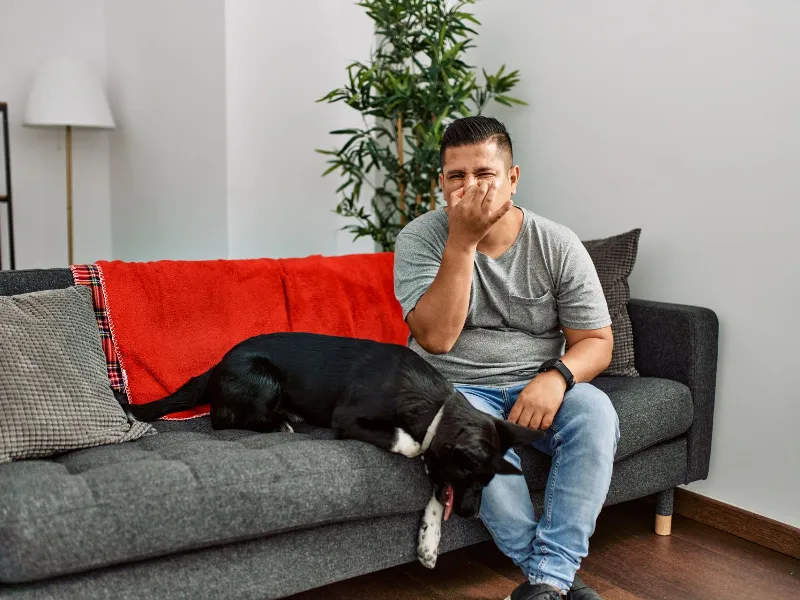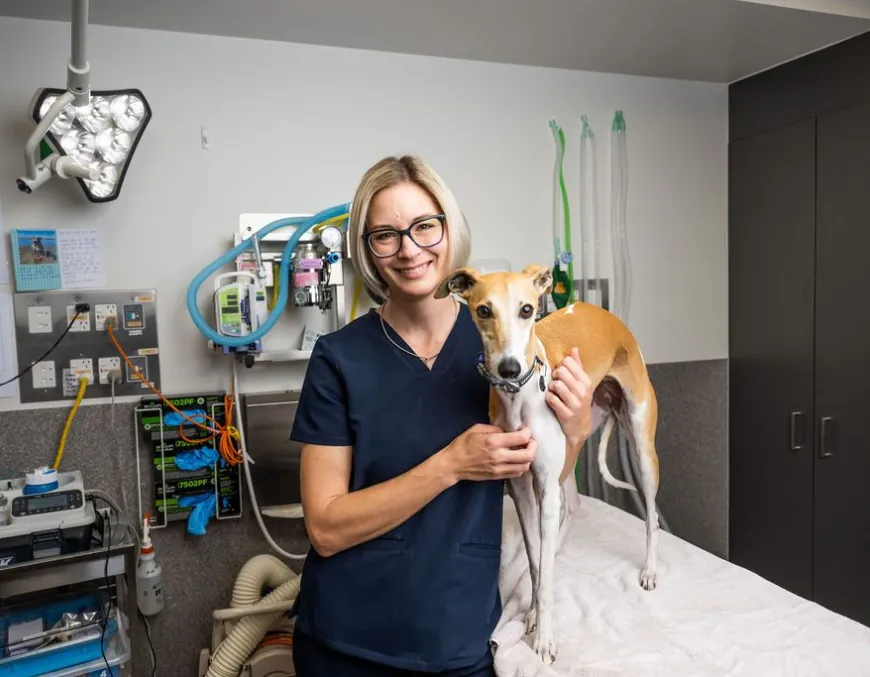Removing complex teeth safely and with minimal impact.
You get used to a lot when you live with a dog. Paw prints on freshly mopped floors, fur on the couch and chew toys scattered long after the human children have finally learned to tidy up. But smelly kisses that make you turn away should not be one of them. The truth is, despite popular belief, doggy breath is not normal. It is almost always a sign of trouble with their oral health or dental disease.
At Advanced Animal Dentistry, we’re not just here for teeth. We’re passionate about the health and happiness of every animal. Dental disease can cause real pain and discomfort, yet many owners overlook it because we’ve been told for so long that bad breath is just part of being a dog.
Here’s what really lies behind that smell and how you can help your dog feel better.
Why do so many owners think bad breath is normal?
Bad breath in dogs comes from bacteria living in the plaque on their teeth. As these bacteria break down food, they release pungent by-products. Over time, the plaque hardens into tartar (calculus), and more bacteria accumulate. The smell worsens so slowly that many owners stop noticing and believe it has always been there. A puppy’s mouth might start out fresh and clean, but as plaque builds, the slow change in odour often goes unnoticed.
Another reason we often overlook bad breath (or halitosis) in dogs is history. In past generations, dental care for dogs was rarely a priority. Many people grew up with dogs whose breath was a little foul simply because nothing was done to prevent it, and yet, that then became their idea of what was normal.
Owners often blame the odour on harmless things like what their dog has eaten or just their general doggy smell. They assume dinner scraps, bones, kibble, or even foods like tuna are to blame, rather than recognising it as bacteria building up on the teeth. Many also don’t realise it can come from deeper under the gum line, where nothing is visible.
What really causes bad breath in dogs, then?
If we’re talking about oral health conditions and not just the basic presence of bacteria on the teeth, periodontal disease is by far the most common culprit. This condition damages the tissues and bone that support the teeth and gives bacteria the perfect environment to thrive. While it can have a very distinctive odour that is surprisingly similar across dogs, humans and even horses, there are other causes that are just as recognisable to a trained nose.
Ulcers, non-healing wounds and oral tumours inside the mouth often produce a harsh, rotten scent. Canine Chronic Ulcerative Stomatitis (CCUS) has its own unique pungent odour. We occasionally see dogs with a bone or stick wedged between their teeth or across the roof of the mouth, and they usually have a sudden, very noticeable smell that resolves once the object is removed. Even infections in the lips or fur around the mouth can give off a yeasty stink.
Some non-oral conditions can also lead to halitosis. Dogs with kidney disease often have an ammonia-like breath. Those with poorly controlled diabetes can develop a distinctive sweetness or fruity note, while gastrointestinal issues like reflux can leave a metallic or acidic edge. Experienced veterinarians sometimes know what is going on the moment a dog arrives because their breath gives it away before the examination even starts.

Why you shouldn’t ignore strong doggy breath
One of the most important reasons not to ignore bad breath is that you can’t always see what’s going on. The surface of the teeth might look fine, but serious damage often happens below the gum line. Periodontal disease can quietly break down the bone and tissue that hold the teeth in place quietly for months or even years without any obvious signs. Many owners are then shocked when their dog suddenly needs several teeth removed.
Covering up the smell instead of dealing with its root cause can also lead to serious damage. Well-meaning owners often turn to commercial products like chews, water additives or daily bones hoping to fix the problem.
The breath might seem better for a while, but none of these actually treat the underlying disease. In some cases, they even make things worse by letting the condition progress unnoticed.
When periodontal disease reaches an advanced stage, it can cause constant discomfort and pain that many dogs stoically endure in silence. Once treated, owners are often surprised by how much happier and more energetic their dogs become, finally realising what they had been living with all along.
As an owner, how can I help maintain good oral health and fresh breath for my dog?
If you notice your dog’s breath changing, the best first step is to book a professional dental check before starting any home care. You don’t want to introduce chews or other products that might just mask the real problem, and you definitely don’t want to start brushing if their gums are already sore. A proper examination will identify and treat any issues first so that home care becomes a comfortable and effective way to maintain their oral health.
Regular brushing, when introduced at the right time and done gently, is one of the most effective ways to prevent plaque from building up again. If you need help getting started, watch our detailed tutorial by Dr Bec Tucker.
A healthy mouth shouldn’t have any doggy breath at all. Pay attention to any changes, and see your vet if the smell returns. Starting good dental habits early can spare your dog pain and help them enjoy a better quality of life for years to come.
Clearing the air on halitosis
While humans tend not to love strong smells, we’ve seen over the years how easy it is for dog owners to live with them without realising how bad it has become. Once, Dr Aaron pointed out to a client that the dog’s bad breath was gone after treatment, and the client admitted she had been blaming her husband for the smell. While it’s a little bit funny, it’s also a reminder that we sometimes miss what’s right under our noses. Pun intended.
If doggy breath has you avoiding kisses, you and your pet may not just be missing out on love and affection. You could also be overlooking a serious oral health issue that is causing real pain and discomfort. Don’t write it off as normal. Speak to your vet.
If you’ve noticed your dog’s breath getting worse, book a professional dental check with our team today through our contact form. We’ll work closely with your primary vet to make sure your dog gets the care they need.
You can also visit our pet owners’ page to explore more resources.














